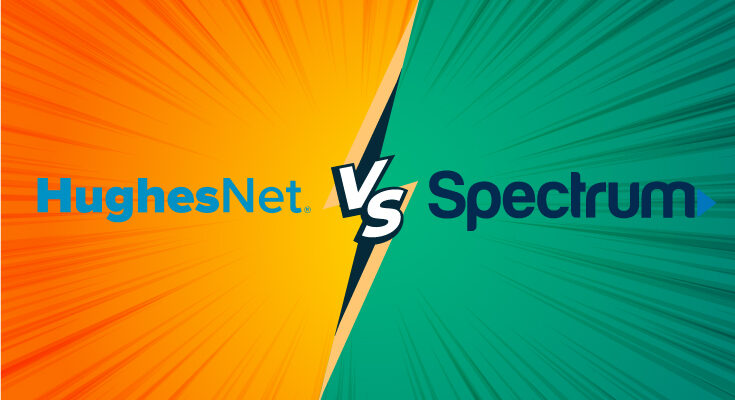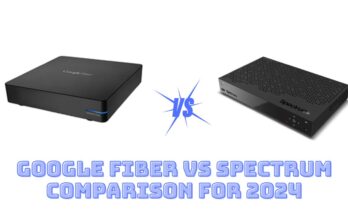In the ever-evolving landscape of internet service providers, choosing the right one can be a daunting task. Two prominent contenders in this arena are Spectrum and Hughesnet. Each has its own set of strengths and weaknesses, catering to different needs and preferences. Explore and select the most appropriate internet plans with one of the leading internet providers i.e., Top Internet Plans. Let’s delve deeper into the comparison between Hughesnet vs Spectrum to help you make an informed decision.


Discover the differences between HughesNet vs Spectrum for internet services. Find out which provider suits your needs.
Spectrum Internet – Fast, Reliable, and Customer-Centric
Spectrum has built a reputation for providing fast and stable cable internet to its customers. With a focus on meeting customer needs, Spectrum offers stable and consistent internet speeds, unlimited data allowances, and no contractual obligations. However, it’s worth noting that Spectrum Internet Service offers fewer plan options and may experience price hikes after the initial year.
Spectrum Internet Plans cater to a range of needs, from basic browsing to heavy streaming and gaming. With options like Spectrum Internet, Spectrum Internet Ultra, and Spectrum Internet Gig, customers can choose the plan that best suits their requirements and budget.
Spectrum Internet Packages
| Plan | Maximum Download Speed | Cost | Connection Type |
|---|---|---|---|
| Spectrum Internet | Up to 300 Mbps | $49.99/month | Cable |
| Spectrum Internet Ultra | Up to 500 Mbps | $69.99/month | Cable |
| Spectrum Internet Gig | Up to 1 Gbps | $89.99/month | Cable |
Hughesnet Internet – Bridging the Gap in Underserved Areas
Hughesnet Internet Packages fill a crucial gap by providing internet access in areas where cable, fiber, or other types of connections are not available. As a satellite internet service provider, Hughesnet ensures internet availability in rural and remote locations. While its internet speeds may not match those of cable providers like Spectrum, Hughesnet offers flexibility in data allowances and relatively reasonable pricing.
One notable feature of Hughesnet is its Bonus Zone, which provides additional data during off-peak hours without extra charges. This can be particularly beneficial for users who need to download or stream large files during these times.
Hughesnet Internet Plans
| Plan | Maximum Download Speed | Cost | Connection Type |
|---|---|---|---|
| Hughesnet 15 GB Internet | 25 Mbps | $49.99/month | Satellite |
| Hughesnet 50 GB Internet | 25 Mbps | $49.99/month | Satellite |
| Hughesnet 100 GB Internet | 25 Mbps | $64.99/month | Satellite |
| Hughesnet 200 GB Internet | 25 Mbps | $124.99/month | Satellite |
Comparing Internet Plans
When comparing internet plans, Spectrum Internet deals offer faster speeds and more diverse options compared to Hughesnet. Spectrum’s cable connection allows for speeds of up to 1 Gbps, while Hughesnet’s satellite connection offers a maximum speed of 25 Mbps. Additionally, Spectrum’s no-contract policy and unlimited data allowances provide added flexibility and peace of mind for customers.
Explore Spectrum and Hughesnet Bundle Deals
Spectrum Internet Service offers the flexibility to tailor your Internet plan by incorporating additional services seamlessly. The convenience lies in the consolidation of all services under one bill, eliminating the hassle of managing multiple invoices. For added convenience, you can opt to include the TV Select package alongside any Spectrum Internet plan, granting you access to complimentary HD channels.
One of the standout deals from Spectrum is the combination of Internet and TV services, providing a comprehensive entertainment solution for households.
Comparing Hughesnet vs Spectrum Bundle Deals
| Bundle | Maximum Download Speed | Channel Count | Cost |
|---|---|---|---|
| Spectrum Internet + TV Select Signature | Up to 300 Mbps | 150+ | $109.98/month |
Customer Service and Connection Types
Both Spectrum vs Hughesnet prioritize customer service, with dedicated teams available to assist customers day and night. Spectrum utilizes a network of coaxial cables for its internet connections, while Hughesnet relies on satellite infrastructure. While Spectrum’s cable connection generally provides faster and more reliable speeds, HughesNet’s satellite connection enables access in areas where other options are unavailable.
Availability and Recommendations
Spectrum is available in 41 states, making it accessible to a large portion of the population. HughesNet, with its satellite infrastructure, covers almost 50 states, including many rural and remote areas. Ultimately, the choice between Spectrum and HughesNet depends on factors such as location, internet usage, and budget.
Conclusion
So, Spectrum and Hughesnet Internet plans cater to different needs and preferences in the realm of internet service provision. Spectrum excels in providing fast and reliable cable internet to a wide customer base, while HughesNet bridges the gap in underserved areas with its satellite internet offerings. Depending on your location and requirements, either Spectrum or HughesNet could be the right choice for you. Consider factors such as internet speed, data allowances, pricing, and availability before making your decision. To know more about internet deals, call Top Internet Plans customer care number – +1(855)-217-9882.



